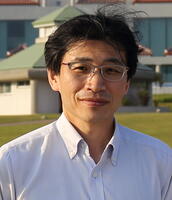Seiichiro Tani is a researcher on the theory of computing and algorithms, especially quantum ones. His research interests include the mathematical aspects of quantum algorithms, quantum complexity theory, and quantum information theory and their application to cryptography.
Seiichiro Tani received a B.E. in information science from Kyoto University, Japan, in 1993 and an M.E. and Ph.D. in computer science from the University of Tokyo, Japan, in 1995 and 2006, respectively. After entering NTT corporation, he worked on the algorithms for delay testing of circuits at NTT LSI Laboratories in 1995 and moved to NTT Network Innovation Laboratories in 1998. From 2003 to 2024, he studied quantum computing theory at NTT Communication Science Laboratories. He was a Distinguished Scientist there, the Leader of the Computing Theory Research Group, and the Project Manager of the Research Center for Theoretical Quantum Information in NTT Basic Research Laboratories. Since 2024, he has been a Professor at Waseda University. He is also an Associate Member of the Science Council of Japan (SCJ).
He was a researcher of the ERATO/SORST Quantum Computing and Information Project, Japan Science and Technology Agency (JST) from 2004 to 2009, a Visiting Researcher at the Institute for Quantum Computing (IQC), the University of Waterloo from 2010 to 2011, and a Visiting Professor at the Quantum Computing Unit, International Research Frontiers Initiative, Tokyo Institute of Technology, from 2022 to 2024.
He received the Institute of Electronics, Information, and Communication Engineers (IEICE) Achievement Award and the IEICE Information and System Society Best Paper Award. He also received the Maejima-Hisoka Award and the Support Center for Advanced Telecommunications Technology Research (SCAT) Chairman Award. He is a member of the Association for Computing Machinery (ACM), the Institute of Electrical and Electronics Engineers (IEEE), IEICE, and the Information Processing Society of Japan (IPSJ).


Click to view the Scopus page. The data was downloaded from Scopus API in February 26, 2026, via http://api.elsevier.com and http://www.scopus.com .